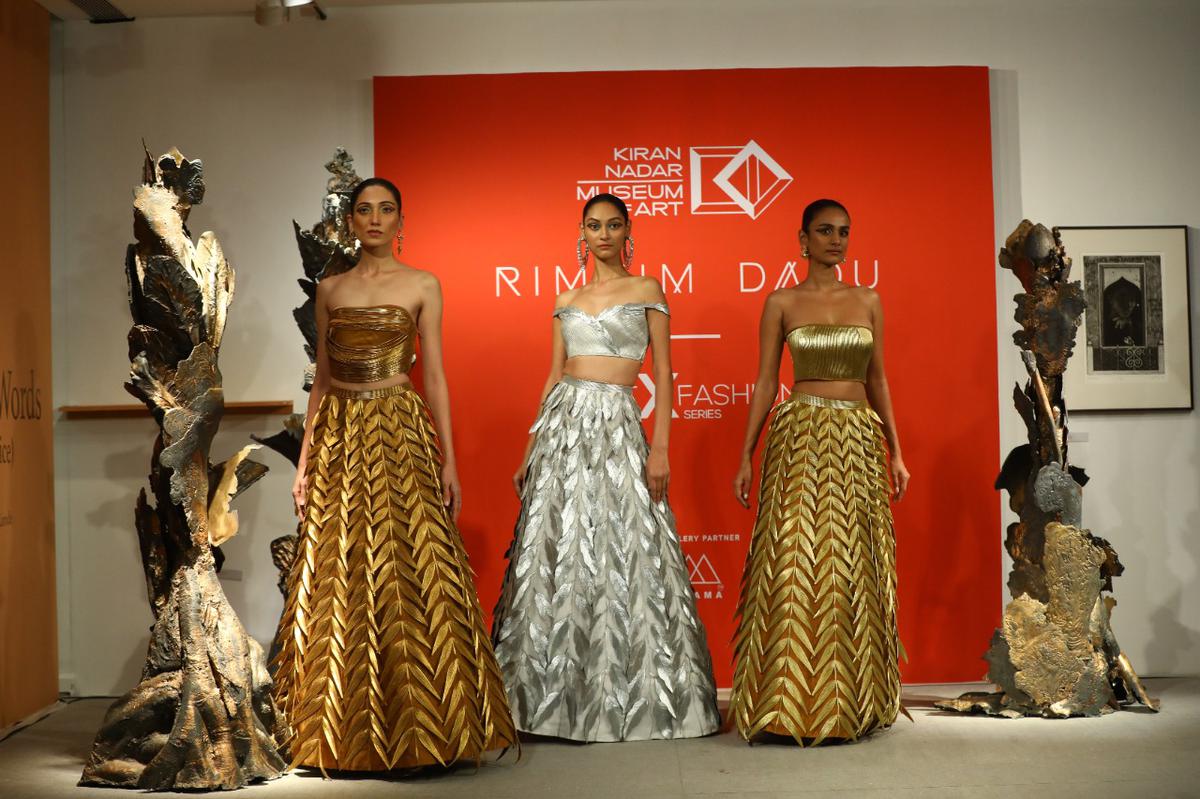The impossible-to-plagiarise designer on her ‘mad maxification’ of textile blends, and celebrating 15 years in the business
The impossible-to-plagiarise designer on her ‘mad maxification’ of textile blends, and celebrating 15 years in the business
“How could making a sari with steel have ever been a business decision?” This is the loudest I have heard Rimzim Dadu, 36, a decidedly quiet and introverted designer exclaim. It is a reaction to my rather pointed question: Was the metallic sari (inarguably, the brand’s biggest selling piece) a business decision? At ₹1.2 lakh (approx) a pop, it is like buying art; and yet the brand sells hundreds of them a year.
“My team thought I was mad. First: It was technically unheard of. Second: Why? Finally, they figured, it was to be an experimental piece in that particular collection for magazine editorials,” she says. Introduced in 2016, the metal sari changed the face of Rimzim’s eponymous label, that is now celebrating its 15th anniversary. (For this unique sari, hair-thin strands of steel are hand assembled and sewn together over 120 hours to create a single piece.)
Dadu at London
In 2014, as a part of ‘Fabric of India’ the prestigious V&A museum in London showcased Rimzim Dadu’s take on a a traditional Ikat Patola. Individual leather cords in different colours are reassembled to form the Ikat weave motifs.
Later in the 2016, actor and fashionista Sonam Kapoor wore her radical blue metal pallu sari at the Cannes Film Festival. It skyrocketed sales. It also made clear that India was ready for her brand of Indianwear.
This sculptural sample was the result of Rimzim tinkering with textures for months. Rumour has it, she had previously busted five home mixer-grinders till industrial strength machines were brought in to help with the ‘Mad Maxification’ of textile blends. Under My Village, the initial name for her brand, Dadu had been building a library of impossible-to-forge surface textures that a niche crowd has understood and bought for close to a decade already, but the sari (as it often is in India) was the brand’s big frontier.

Sonam Kapoor in the blue metal saree
| Photo Credit: Special Arrangement
Wearable art
Experiments with steel, leather, deconstructed chiffon and silicone have become Rimzim Dadu brand signatures, and now a favourite with brides looking for something fashion forward for their cocktails and reception looks. It is a testament to her technical prowess that despite being crafted in hard textures, the pieces are perfectly malleable, and surprisingly size and shape agnostic. They seem to work on everyone.
For her anniversary, the designer kicked off celebrations on August 26 with a select few journalists and brands. A special fashionista food collaboration dinner was hosted by Glenfiddich and curated by star chef Prateek Sadhu at The Lodhi, New Delhi. The dinner table was accented with a signature corded fabric runner and fiddle-leaf fern medu vadas were served on metal sheets from the brand’s material library. The next evening, she showcased a line of new and archival pieces of lehengas, saris, dresses and men’s shirts in her signature metallic textiles at Kiran Nadar Museum of Art (KNMA), New Delhi as a part of KNMA’s Art x Fashion series. Models, influencers and senior artists such as GR Iranna, Vibha Galhotra and Manisha Gera Baswani walked the ramp. Bollywood darlings Vijay Verma and Tara Sutaria opened and closed the show respectively. A retrospective of her 15 year journey with India modern textiles runs at the museum until September 4.
All in the family
“15 years ago, when I started the brand, my father’s only advice to me was to ensure my designs were completely unique and nothing like them existed in the market already. They had to fill a gap,” says Rimzim about her father, a garment exporter to European markets in athleisure and RTW (ready-to-wear) categories.
Being exposed to an international design language on business trips with him, and spending hours observing the manufacturing process so early on, meant she learnt about the business of fashion before the art of it. To her, the design intervention is of paramount importance and the fame that accompanies it a by-product. “I may not look or dress like a fashion person, but I knew this is where I belonged.”
The ‘failed triumphs’
On show day, Rimzim has generously dressed many attendees — influencers, PR representatives, journalists and guests. Her entire design directory is on display. It seems like a lot, but later on, a guest stops by to tell her that seeing so many differently-sized people wear her daring designs gave them confidence to invest in her pieces.

From the 15th anniversary special show
| Photo Credit: Special Arrangement
In a country that confuses couture for bridal wear, Rimzim’s genius lies in her fearless experimentation to achieve a razor sharp finesse. There is no room for compromise, but plenty for errors. An entire wall at KNMA is dedicated to her “failed triumphs” — surface texture experiments that never made it to the ramp but were important in her journey. Only one question remains: If she uses steel to make clothes, what will she blend to make furniture and lighting? Home design is something she wishes to extend her brand to.
























